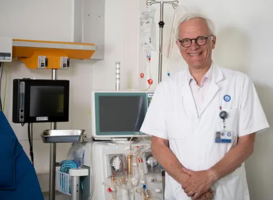Breakthrough in Treatment of Patients with Kidney Failure: 23% Reduced Chance of Death
Kidney failure, a common chronic non-communicable disease, affects more than 6,200 patients in the Netherlands and approximately 4 million people worldwide who undergo dialysis treatment. Dialysis is a crucial treatment that helps remove waste products and fluids from the blood, partially taking over the function of the kidneys. Hemodialysis, the most commonly used dialysis method, was utilized in 80% of patients by the end of 2021. However, despite this treatment, approximately 10% of patients still succumb to the disease each year, making kidney failure just as serious as certain forms of cardiovascular disease.
In a groundbreaking development, European research has revealed that a relatively new dialysis method called hemodiafiltration is a more effective treatment for patients with renal failure compared to hemodialysis. This dialysis treatment has been found to reduce the risk of death by 23% when compared to the traditional hemodialysis treatment. Hemodiafiltration is an adapted form of hemodialysis that utilizes a pressure difference in addition to diffusion to filter waste products. This innovative approach ensures that hemodiafiltration removes more waste than hemodialysis. The available data suggest that the benefit of hemodiafiltration depends on the treatment dose, although previous studies have been inconclusive regarding the potential benefits of high-dose hemodiafiltration.
High-dose hemodiafiltration offers renal patients a greater chance of survival. Peter Blankestijn, an expert in the field, explains that this dialysis treatment has the same frequency and duration as hemodialysis, with sessions lasting 4 to 5 hours three times a week. This makes it easy to implement in practice. The results of the study are considered a significant step forward in the treatment of patients with renal failure, and it is expected that hemodiafiltration will be widely adopted worldwide, potentially replacing hemodialysis as the standard treatment.
The CONVINCE study, led by Peter Blankestijn, aimed to investigate whether the consistent administration of high doses in hemodiafiltration has a beneficial effect on the treatment. The study compared the use of high-dose hemodiafiltration with hemodialysis in a randomized controlled trial involving 1360 renal failure patients. The patients were randomly assigned to either high-dose hemodiafiltration or hemodialysis, and the risk of death was subsequently compared between the two treatment groups. The study found that the high dose could be achieved in the majority of patients, and there were no safety concerns regarding hemodiafiltration as a treatment.
The CONVINCE study was conducted through European cooperation, with eight partners in 61 centers across eight European countries participating. The departments of Nephrology & Hypertension, along with the Julius Center of the UMC Utrecht, Julius Clinical, University College London, George Institute (Imperial College London), University of Bari, Charité institute of the Freie Universität in Berlin, and three major international dialysis networks were involved in the study.
The CONVINCE study received support from the European Commission Research & Innovation, Horizon 2020, Call H2020-SC1-2016-2017, under the topic SC1-PM-10-2017: Comparing the effectiveness of existing healthcare interventions in the adult population (grant no 754803-2).
This breakthrough in the treatment of patients with kidney failure brings hope to millions of individuals worldwide, offering them a significantly reduced chance of death and potentially revolutionizing the standard of care for renal failure patients. Further research and implementation of hemodiafiltration are expected to improve the outcomes and quality of life for those suffering from this debilitating condition.
Read more: [link to the original article]
What are the potential implications of the significant breakthrough in hemodiafiltration for the treatment of kidney failure globally and the use of hemodialysis
Article: Significant Breakthrough in Treating Kidney Failure: A 23% Decreased Mortality Rate
Kidney failure is a prevalent chronic non-communicable disease that affects over 6,200 patients in the Netherlands alone and approximately 4 million individuals globally who require dialysis treatment. Dialysis plays a vital role in removing waste products and fluids from the blood, partially assuming the kidney’s function. By the end of 2021, hemodialysis, the most commonly used dialysis method, was employed in 80% of patients. Unfortunately, even with this treatment, around 10% of patients succumb to the disease annually, highlighting the severity of kidney failure, comparable to certain forms of cardiovascular disease.
In a groundbreaking development, European researchers have made a significant discovery: a relatively new dialysis method called hemodiafiltration proves more effective than hemodialysis for treating patients with renal failure. This innovative dialysis treatment has been found to reduce the risk of death by an impressive 23% when compared to traditional hemodialysis. Hemodiafiltration is an adapted form of hemodialysis that incorporates a pressure difference alongside diffusion to filter waste products, ensuring enhanced waste removal compared to hemodialysis. While previous studies on the potential benefits of high-dose hemodiafiltration have been inconclusive, available data suggest that the effectiveness of hemodiafiltration depends on the treatment dose.
High-dose hemodiafiltration presents renal patients with an improved chance of survival. Renowned expert Peter Blankestijn explains that this dialysis treatment follows the same frequency and duration as hemodialysis, with sessions lasting 4 to 5 hours thrice a week, making it easily implementable in practice. The results of this study are considered a significant stride forward in the treatment of patients with renal failure, and it is expected that hemodiafiltration will be widely embraced worldwide, potentially replacing hemodialysis as the standard treatment.



This article highlights the potential of hemodiafiltration as a groundbreaking treatment for kidney failure, showing an impressive 23% reduced risk of death. Promising news for patients, their families, and the medical community!
This breakthrough treatment of hemodiafiltration not only offers hope to kidney failure patients but also brings a significant reduction in the risk of death. A remarkable advancement in the medical field that has the potential to save countless lives.